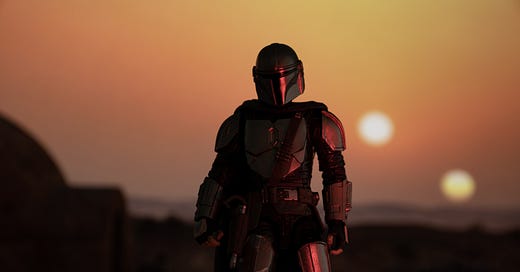What Star Wars Means to Me
Happy May the Fourth. Or, as many people now say, May the Fourth be with you. Another recent one is, ‘This is the May’. Whatever you use, I join you in our common love for Star Wars.
I’ve been a Star Wars fan for as long as I can remember. It was part of the cultural landscape in my childhood (1980s), and remains so today. The saga served as my gateway into science fiction. At that time, there was nothing quite like it, even though it borrowed heavily from Flash Gordon, Akira Kurosawa, 2001: A Space Odyssey, and Joseph Campbell’s ideas on monomyths. The universe George Lucas presented felt lived in, and its characters, fallible and intriguing. Now, well into the 21st century, Star Wars continues to be a part of mainstream culture. For a time, its critics found the saga’s portrayal of good vs. evil a quaint, simplistic narrative meant to fuel the franchise’s merchandising machine (which it did, and still does). They assumed evil had to be complex, nuanced. It does not.
We have learned that the hard way these last several years. The rise of fascism worldwide has demonstrated that fact, from Trumpism, to Putin’s invasion of Ukraine. Like many, I’d hoped (assumed?) our civilization had matured past such abhorrent ideas. We have not.
Which leads me to what Star Wars means to me today, a science fiction author in his mid-40s. I’m older now, and a storyteller myself. Nostalgia casts convenient blinders over one’s favorite things; I am well aware of Star Wars’ shortcomings, if I spend the time nitpicking them. These stories were intended to entertain and remain memorable for a lifetime. Regardless of what you may think of how the saga handles the former, it has achieved the latter in grandest fashion. That is something to be studied by all storytellers, irrespective of genre or medium.
The saga still delivers action, comedy, adventure, morality plays, and fantastical technology that ignores physics in favor of spectacle. The Death Star trench run remains my favorite action scene of all time. Yoda’s wisdom continues to inspire me; ‘there is no try’. I still get chills seeing someone in Beskar armor.
But now, especially in light of Rogue One, Andor, and Rebels, Star Wars signifies the fight against oppression. The Empire is little better than an analog for the Third Reich, and is seen as such by those who are not only paying attention, but refuse to ignore the bantha in the room any longer.
Star Wars can bring out the worst in us, too. The countless heated arguments amongst its dedicated fandom. The racist trolling of Kelly Marie Tran. The bullying of actors such as Ahmed Best and Jake Lloyd, both of whom considered suicide as a result. The homophobia regarding a gay character from Chuck Wendig’s novel, Aftermath. The ecological cost of manufacturing countless products, many of which will end up in a landfill—and then the human cost of the labor required to bring us the latest Grogu plushie. Its cautious steps in handling greater representation have irked some (few LGBT characters, few POC that are main protagonists), but Disney has made some effort in this arena, and I’m certain that will continue. Also, as an author, I’ve been rankled by how Star Wars writers have been handled by the franchise’s current owner; the refusal to pay Alan Dan Foster his due royalties is one particular example.
Star Wars is still dear to me, however, and the joy it brings me, and millions of others, cannot be measured. It still lets people imagine a galaxy far, far away. It still evokes the wonders of traveling to other worlds. It still focuses on those who fight against injustice, oppression, bigotry, and tyranny. And it is still accessible to fans of all ages. Some might call this quality its greatest weakness, but I call it Star Wars’ greatest strength.
This is indeed the way.
Photo by Michael Marais on Unsplash.




